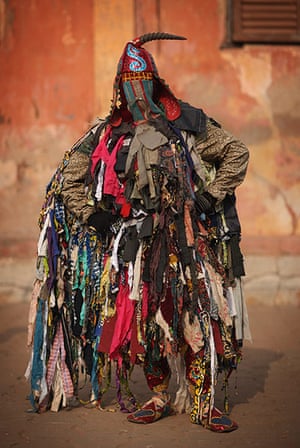Kripplestyle
Beaker
Brehs I found a better image below:



That is masquerade garb, not really specific to the Yoruba or any particular ethnic group.
 I'm forever learning
I'm forever learningAkanculture obliterated any other African customs and incoming non-Akan Africans had to submit to the culture of the majority Akan population in Jamaica, much like a foreigner learning migrating to a foreign country. Other than Ananse stories, Akan religion made a huge impact. The Akan pantheon of gods referred to as Abosom in the Twi language were documented.
Enslaved Akan would praise Nyankopong(erroneously written by the British as Accompong [Twi: Akyeampong]); libations would be poured to Asase Yaa (erroneously written as 'Assarci') and Epo the sea god. Bonsam was referred to as the god of evil.
Kumfu(from the word Akom the name of the Akan spiritual system) was documented as Myal and originally only found in books, while the term Kumfu is still used by Jamaican Maroons. The priest of Kumfu was called a Kumfu-man.
Kumfu evolved into Revival, a syncretic Christian sect. Kumfu followers gravitated to the American Revival of 1800 Seventh Day Adventist movement because it observed Saturday as god's day of rest. This was a shared aboriginal belief of the Akan people as this too was the day that the Akan god, Nyame rested after creating the earth. Jamaicans that were aware of their Ashanti past while wanting to keep hidden, mixed their Kumfu spirituality with the American Adventists to create Jamaican Revival in 1860. Revival has two sects: 60 order(or Zion Revival, the order of the heavens) and 61 order(or Pocomania, the order of the earth). 60 order worships God and spirits of air or the heavens on a Saturday and considers itself to be the more 'clean' sect. 61 order more deals with spirits of the earth. This division of Kumfu clearly shows the dichotomy of Nyame and Asase Yaa's relationship, Nyame representing air and has his 60 order'; Asase Yaa having her 61 order of the earth.
There are two branches, the 60 Order or Revival Zion, and the 61 Order or Pocomania. Zion tends to have many elements of orthodox European religions, while Pocomania represents mainly elements of African spiritual worship and practices.